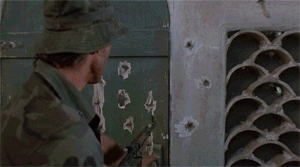Baseball Needs Instant Replay: Confirmed
I just finished watching the last game of the MLB regular season. It was also the best game of the year. I’m not sure if any game in the playoffs will top it. The Padres were playing the Rockies for the National League Wild-Card spot after they ended the season in a tie. The Rockies won 14 of their last 15 games to get to this point. Incredible. They had to battle back again in this game at the last possible moment. After Jorge Julio, one of the worst pitchers to put on a Major League uniform this year, let up a 2-run HR in the top of the 13th inning, the Rockies were down 8-6.
But Trevor Hoffman had blown his last save opportunity – there was still a chance. Before an out was even recorded, the Rockies battled to tie the game. With no outs, MVP candidate Matt Holliday was standing 90 feet from clinching a playoff birth for the Rockies. A short fly ball was hit to right field. Brian Giles catapulted a throw home — honestly, it was a horrible throw — and the ball and Holliday arrived at the same time. Holliday slid head first into the left leg of Michael Barrett, slamming his face into the ground. The ball came loose. Holliday was safe. The MVP had won it!

Only the umpire Tim McClellan didn’t call him safe. Did Holliday miss the plate? Barrett picked up the ball to tag Holliday as he lay on the ground. But for some inexplicable reason, McClellan decided to call him safe as Barrett reached out to tag Holliday for the second out. Why the hesitation? When replays were shown, it looked like Holliday had never touched the plate. Barrett had blocked the plate perfectly. So why was he called SAFE?!?
As Deadspin editor Will Leitch so keenly observed:
At a certain level, we can’t help but think it was a back-up-I-don’t-want-any-trouble call from the home plate umpire, Tim McClellan. He knew the runner didn’t touch the plate — kind of amazing play by Michael Barrett — but by the time he realized his call was going to matter, he backed off it. We’d call it “gutless,” but it’s really hard to be a Major League Baseball umpire; it requires more guts than we, as a human being, have.
My personal feeling was that Holliday not getting up to touch home plate gave McClellan the impression that he actually touched home plate the first time around, but Leitch’s explanation works too. Or maybe McClellan was trying to make up for the fact that an earlier ball that was ruled a double was actually a Rockies HR. We’ll never know what was going through his mind, but we do know that Holliday still hasn’t scored the winning run.
Which is why baseball needs an instant replay system similar to the NFL. Give a manager a challenge a game. Nothing more than that is needed. All the focus and talk is going to be about this blown call tomorrow, and not on the fantastic game that lead up to it. Sure, it will take some of the entertaining arguments out of baseball, but tennis was known for its vitriolic player rants as well, and I haven’t missed them since instant replay was instituted. Instant replay in that sport has only served to show that not only is Roger Federer better at playing tennis than anyone, he would make a better linesmen than anyone. Balls and strikes should be left alone, so managers and players can still argue about them and get ejected in showboating fashion.
Trust me, you might find it weird and sacrilegious at first, but once you get used to it, you’ll wonder why it took MLB so long to incorporate instant replay.
Related posts:














